Tatsoi (Mustard Greens) Profile
Written by Iris
Nov 08 2021
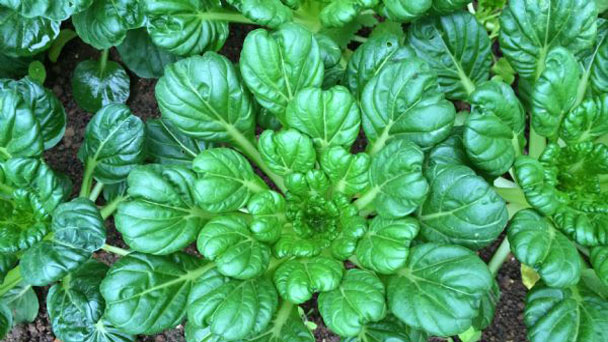
A member of the mustard family, which includes a variety of plants such as broccoli, radish and cabbage, Tatsoi is an elegant edible garden green. Tatsoi plants are grown worldwide for their delicious and healthy spoon-shaped vegetables. Tatsoi is near the ground and grows from rosettes of emerald green leaves with creamy stems. The tatsoi plant does not form a head, as does its cabbage cousin. Tatsoi is shorter than many types of Asian garden vegetables, but produces many broad leaves.
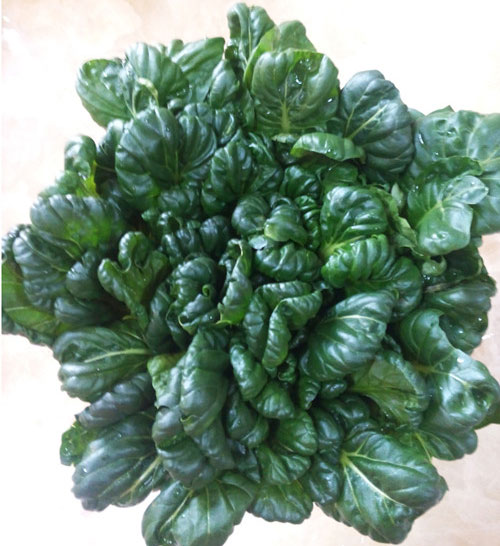
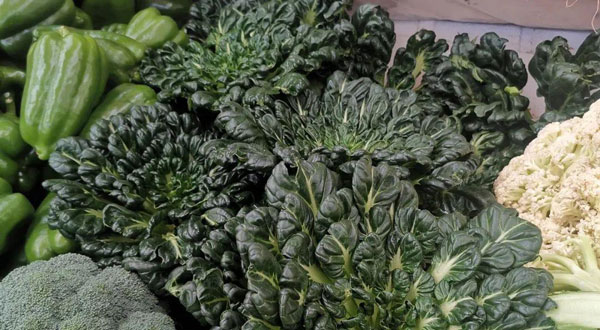
Find a full sun to partial shade, area of your garden to plant. Tatsoi prefers well-drained, well-worked, loamy or sandy soils rich in nitrogen. It thrives outdoors in raised beds or in prepared ground soil.
To sow seed, amend unprepared soil with compost at an average depth of 10 inches. Seeds prefer 50 to 80 degrees to germinate. Create rows ½ to ¼ inches deep, spaced 18 to 24 inches apart. Tatsoi grows outward in a radial fashion, so ensure there aren’t other plants crowded out in that process. Drop seeds in the trench at 1 to 2 inches apart. Seed germination rates are high at 75%, so drop 2-3 per spot. As seedlings mature, thin them to 6 to 8 inches apart. This gives plants plenty of room to grow. Starts mature in 6 weeks.
Plant seedlings in the same temperature conditions you would for seeds but a couple of weeks later, with temperatures between 50 and 80 degrees. Growing tatsoi starts 6 to 8 inches apart, and harvest when leaves are mature — throughout the season until the flowering stage. Starts reach harvest maturity at about 3 weeks.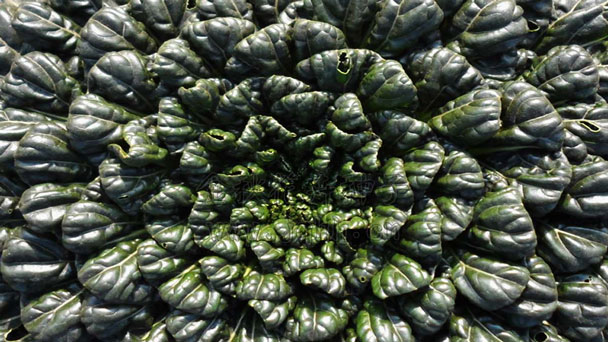
Read details on how to grow and care for Tatsoi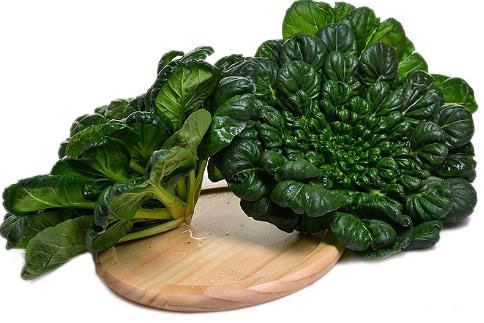
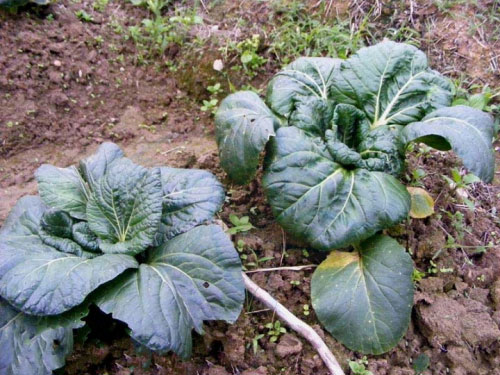
Tatsoi
You often see this variety listed as tatsoi or as an “Asian green.” Organic Asian Green Seed from Johnny’s Seeds is their generic variety. It forms the traditional compact rosette shape, withstands frost and is great in microgreen mixes.
Koji
This hybrid variety has large, savoyed leaves and is good for bunching, which makes it ideal if you are selling at your local farmer’s market. It's also more heat tolerant than other varieties. Plant 12-inches apart for full-size heads.
Red Cloud
This beautiful hybrid variety grows upright and has burgundy colored leaves. Great for bunching or baby leaf and has a long, tender stem. It adds real color and pizzaz to a winter salad.
Lady Murasaki Asian Green
This tatsoi variety comes from Fedco seeds and is named after Lady Murasaki, a famous Japanese author who wrote in 1000 AD. This is a striking purple, open-pollinated variety that holds its color well. It’s also slow to bolt.
Tatsoi (Mustard Greens) PictureTatsoi (Mustard Greens) InfoTatsoi (Mustard Greens) Distribution AreaHow to Grow and Care for Tatsoi (Mustard Greens)How to Grow Tatsoi (Mustard Greens)How to Care for Tatsoi (Mustard Greens)Uses of Tatsoi (Mustard Greens)Edible UsesVarieties of Tatsoi (Mustard Greens)Tatsoi (Mustard Greens) Common Pests/DiseasesTatsoi (Mustard Greens) Companion Plants
Tatsoi (Mustard Greens) Picture

Tatsoi (Mustard Greens) Info
| Botanical Name | Brassica rapa subsp. narinosa |
| Common Name | Tatsoi, Tah Tsai, Spoon mustard, Spinach mustard, Rosette bok choy |
| Plant Type | Biennial |
| Mature Size | 8-10 in. tall, 12 in. wide |
| Sun Exposure | Partial sun to full sun |
| Soil Type | Rich, well-drained |
| Soil pH | Neutral (6.5 to 7.0) |
| Bloom Time | Seasonal |
Tatsoi (Mustard Greens) Distribution Area
Tatsoi is a heritage variety of Brassica rapa cultivated throughout Asia for many centuries. The seeds of this variety are open-pollinated meaning that you can collect them and they'll grow true to type the same as the parent plants.
How to Grow and Care for Tatsoi (Mustard Greens)
How to Grow Tatsoi (Mustard Greens)
- With Seeds
Find a full sun to partial shade, area of your garden to plant. Tatsoi prefers well-drained, well-worked, loamy or sandy soils rich in nitrogen. It thrives outdoors in raised beds or in prepared ground soil.
To sow seed, amend unprepared soil with compost at an average depth of 10 inches. Seeds prefer 50 to 80 degrees to germinate. Create rows ½ to ¼ inches deep, spaced 18 to 24 inches apart. Tatsoi grows outward in a radial fashion, so ensure there aren’t other plants crowded out in that process. Drop seeds in the trench at 1 to 2 inches apart. Seed germination rates are high at 75%, so drop 2-3 per spot. As seedlings mature, thin them to 6 to 8 inches apart. This gives plants plenty of room to grow. Starts mature in 6 weeks.
Plant seedlings in the same temperature conditions you would for seeds but a couple of weeks later, with temperatures between 50 and 80 degrees. Growing tatsoi starts 6 to 8 inches apart, and harvest when leaves are mature — throughout the season until the flowering stage. Starts reach harvest maturity at about 3 weeks.

How to Care for Tatsoi (Mustard Greens)
- Light
- Soil
- Water
- Temperature and Humidity
- Fertilizer
- Pruning
Read details on how to grow and care for Tatsoi

Uses of Tatsoi (Mustard Greens)
Edible Uses
Tatsoi is an ideal vegetable for stir fry dishes and sauteed with garlic and butter. Many Japanese and Chinese recipes use tatsoi and ginger on beef or noodles or are often eaten raw in garden salads. Its fast growth rate has become a popular ingredient in commercially-produced baby green salad mixes. You may expect such a small plant that grows quickly to lack slower and larger cousins'nutritional benefits. Still, tatsoi offers a potent combination of healthy nutrients. The leaves and stalks are high in Vitamins A and C, both known to boost your immune system and help fight off colds. The tatsoi plant is rich in fiber, calcium, and beta carotene. It offers antioxidant properties that can help detoxify your digestive system.
Varieties of Tatsoi (Mustard Greens)
Be careful when you are looking for tatsoi seed. Many times it is confused with bok choi or mizuna because they are closely related. Remember to watch for the scientific name which is (Brassica rapa subsp. Narinosa). The subspecies is the important part since related species is Brassica rapa.Tatsoi
You often see this variety listed as tatsoi or as an “Asian green.” Organic Asian Green Seed from Johnny’s Seeds is their generic variety. It forms the traditional compact rosette shape, withstands frost and is great in microgreen mixes.
Koji
This hybrid variety has large, savoyed leaves and is good for bunching, which makes it ideal if you are selling at your local farmer’s market. It's also more heat tolerant than other varieties. Plant 12-inches apart for full-size heads.
Red Cloud
This beautiful hybrid variety grows upright and has burgundy colored leaves. Great for bunching or baby leaf and has a long, tender stem. It adds real color and pizzaz to a winter salad.
Lady Murasaki Asian Green
This tatsoi variety comes from Fedco seeds and is named after Lady Murasaki, a famous Japanese author who wrote in 1000 AD. This is a striking purple, open-pollinated variety that holds its color well. It’s also slow to bolt.
Tatsoi (Mustard Greens) Common Pests/Diseases
Tatsoi is a favorite of pests. Common pests include cabbage worms, slugs, leaf hoppers and caterpillars. The key to controlling pests is early detection. Regularly check the core of the plant if there are visible signs of pest infestation, like insect poop or larvae eggs. Spray a neem-based solution once a week to prevent or eradicate pests, applying it generously on the top and bottom leaves, as well as the stems. The plant can still be revived even if most of the leaves are destroyed by pests. Cut the infected leaves, leaving around 2 inches at the bottom. It will grow back its full leaves in about 2-3 weeks.Tatsoi (Mustard Greens) Companion Plants
Tatsoi does well with other brassicas such as cabbage, mizuna, and endive. It will also play nice with lettuce, parsley, and spinach. It makes a nice edible landscape plant along with violets, pansies, and nasturtiums. You can also grow it with other greens found in mesclun mixtures.Read Next:
15 Fall Vegetables to Plant for Your Autumn Garden
Latest Updated
- Benefits of Bugleweed - 7 Science-backed Health Benefits
- Bugleweed Dangers & Side Effects - Is It Poisonous?
- How to Plant Evergreen Trees - What You Should Know
- When to Plant Evergreens - Grow Guide for Evergreen Trees
- 12 Wonderful Evergreen Shrubs for Your Garden
- 12 Popular Evergreen Plants with Pictures for Beginners
- When And How To Prune A Lilac Bush Like a Pro
- How to Grow & Care for Lilac Vine (Hardenbergia Violacea)
- Japanese Lilac Tree (Syringa Reticulata) Care & Propagation Guide
- Shumard Oak Pros and Cons - What to Know
Popular Articles
- Winter maintenance of Antirrhinum Majus
- How to Grow Terminalia Mantaly Tree
- How to Grow and Care for Crossostephium Chinense
- How to grow Antirrhinum Majus in spring
- Peristeria Elata (Dove Orchid) Profile: Info & Care Guide
- Underwatered Snake Plant (Sansevieria Trifasciata) - Signs And How To Fix
- How to Care for Brazilian Jasmine Plant (Mandevilla Sanderi)
- How to Grow & Care for Graptopetalum Purple Delight in Summer
- Rosa Chinensis (China Rose): Plant Growing & Care Tips
- How to Care for Baby Sun Rose (Aptenia Cordifolia)